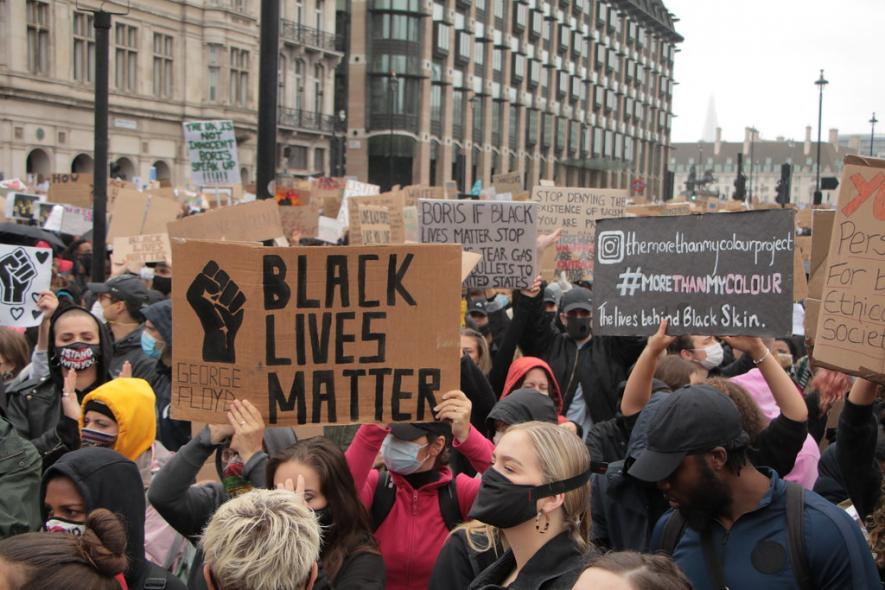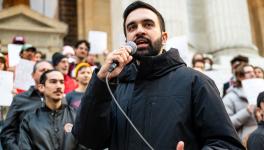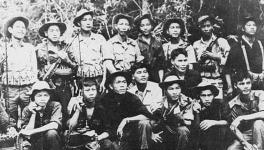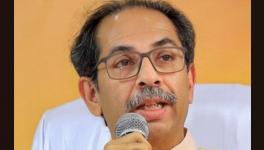Rhapsody in Black: Is Humanity Uniting at Last?

Black Lives Matter Protest in London on June 6th, 2020
My generation grew up in an ever-changing world of power and protests. The aftermath of World War II cast shadows on our childhood. The Cold War provided excitement in our youth. Protests against Nuclear Disarmament were in vogue. As students of London University my sister and I joined the marches to Aldermaston, hoping our parents would not see us on BBC TV news. We joined the anti-Apartheid meetings, and reproached our father for smoking Rothman cigarettes which were products of South Africa ruled by infamous Dutch Afrikaans.
As young adults we saw condemnation of the Vietnam War and eruption of violent protests in American university campuses. We retained our belief in the democratic virtues of the Western world, of the freedom of speech and expression which were being imperceptibly eroded by subtle methods in our own homeland.
As the twentieth century progressed there were numerous wars of liberation in Asia and Africa when colonial rule was overthrown. Ironically democratic United States did not lend support to these movements. When the people of East Pakistan rose against their brutal West Pakistani overlords and were being massacred by West Pakistani army, USA under Nixon and Kissinger openly supported the oppressive regime of Bhutto and the suppression of Bengali rebels. The Soviet Union assisted India who supported the people of East Bengal, soon to be named Bangladesh. This episode eroded the image of the United States as a champion of the oppressed. Other skirmishes followed. The CIA made attempts to topple the socialist government of Cuba. Failing there, the CIA turned to socialist Chile where a coup was duly arranged and President Salvador Allende, who tried to stop plunder of Chile’s resources, was assassinated in 1973.
The war in Vietnam continued. Images of the massacre in Mai Lai, of police shooting unarmed students in university campuses shocked the world. America’s defeat in Vietnam was a festering wound and it clamoured for revenge against Russia. The opportunity for revenge presented itself in Afghanistan when the United States decided to topple a government friendly to Russia. To do this, they armed and funded unemployed Afghan youth who christened themselves as mujahideen. A terrible civil war began; the tragedy of Afghanistan began and continues today.
Soon after, the evenly-balanced world of the Cold War era disappeared, to replaced by a unipolar world dominated by USA. Thus empowered it facilitated the fragmentation of Yugoslavia resulting in another terrible civil war between Serbs, Croats, Bosniaks. Paradoxically, the group that USA sponsored in Afghanistan and Bosnia—Islamists—bombed the Twin Towers in New York. To hunt out Osama bin Laden, the organiser of this atrocity, the United States invaded Afghanistan in September 2001, while bin Laden had found refuge in Pakistan, the avowed ally of USA! The United States’ invasion of Afghanistan ended Taliban rule but plunged that country into carnage and chaos. It did not end there. Next on the invasion agenda was Saddam Hussein’s Iraq.
There again the casus belli—weapons of mass destruction—were never found but a stable country was ripped apart in violence so that Bush and his Sancho Panza Blair could seize Iraq’s oil wells. Then came the intervention in Libya and Syria so that presidents close to Russia could be “taken out.” The cradle-lands of human civilisation now lie in rubble and ruins where starving, homeless millions face extinction.
The civilised world watched helplessly in apprehension as the leader of the “free world” intimidated his opponents, threatened Iran with “our beautiful fantastic weapons they have never seen,” abused an entire continent by calling it “a shithole”, displayed schizophrenic passion for China and North Korea, treated European allies with contempt.
Then, amidst a terrifying pandemic an unoffending, unarmed black American was killed in cold blood by a burly white American policeman. Once more the world watched a video in horror as the cop pressed his knee on the throat of the hapless George Floyd who kept gasping, “I can’t breathe!” When the breath went out of him, the motionless body lay slumped on the ground.
When the Civil Rights movement was in full bloom in 1963 under the auspices of the Kennedy brothers and Reverend Martin Luther King, James Baldwin wrote a powerful book. In The Fire Next Time he made a fervent plea to “end the racial nightmare”. The title was as fiery as the contents. “Do I really want to be integrated into a burning house?” Baldwin asked. He said that Whites should accept a multiracial society and discrimination and segregation could only bring decay and sterility to America, and finally destruction, at the hands of the oppressed African Americans who had borne cruelties and injustices for centuries and on whose slave labour American prosperity was built. Abraham Lincoln had delivered them liberty, but could not guarantee equality. President Lincoln’s warning “a house divided cannot stand” went unheeded.
Baldwin’s book exposed the stark realities before ostrich liberals of the day who were disturbed by his denunciations. He warned that degradation and oppression of one people by another is “a recipe for murder”; that “colour is not a human or a personal reality; it is a political reality”; that whites “can only truly liberate themselves when they liberate blacks, indeed when they become black symbolically and spiritually;” that blacks and whites “deeply need each other” if America was to be a truly integrated nation. This eloquent and moving book was a Rhapsody for Black people in a house divided.
The Fire Next Time went unheeded. President John Kennedy, his brother Senator Robert Kennedy, and King were assassinated. These acts held up to the world the image of a violent racist society. Some concessions were made, but the racism continued with illusory liberties.
The death of George Floyd has awakened the United States to a new life. It is as if an avalanche of grim historical memories flowed over her town and cities, across fields of “amber waves of grain” and “from sea to shining sea.” The terror of Covid-19 receded before a fury that has not ever been witnessed in the land of the free and the brave. Disregarding danger of the deadly virus, Americans of all colour, creed and race marched with one poignant chant—“I can’t breathe” reverberating from ground to sky.
In my youth in the West we had seen tumultuous scenes of protests—for civil rights, for ending Vietnam War—where idealistic American leaders like John Kennedy, his brother Attorney General Robert, King, opened up vistas for a more just America. Tragically, all three died at the hands of assassins and conspirators who did not want such an America. In 2003 we saw worldwide protests against USA-UK invasion of Iraq. But we had never seen such scenes as we see today—of global protests against racism and an impassioned plea for humanism, where hundreds of thousands people of different races raised their voice against the brutality that killed Floyd.
One wonders what provoked this worldwide fury. Is it the proximity to death due to Coronavirus that has led to introspection and surge of remorse in the West? What impelled the British protesters in Bristol to tear down the statue of a slave trader and dump it on the river? What made British citizens rush to damage Churchill’s statue and call him a racist? Seeing this rage, statues of politicians associated with colonialism and racism have been boarded up in London. Boris Johnson condemned these acts but no one was listening. Statues of Gandhi and Mandela are being boarded as it is feared that Rightists may vandalise them.
Accompanying the massive angry protests are new trends. For the first time the role and conduct of policing is being questioned. The impunity with which White police violated the dignity and safety of African-Americans is being condemned and expressed in numerous ways. There are proposals for defunding the police departments. Old films such as Gone with the Wind are being banned because it shows Black Americans in poor light. Band-aid has started producing bandages in shades of brown and dark brown to suit darker skin tones. Television serials such as Bachelor have inducted Black actors in lead roles. Both Black and White Americans are now admitting that there is great economic inequality, particularly in the corporate world. Half the young world’s population believe that the existing system creates deeper inequalities.
Finally, the pernicious doctrine of White supremacy, which is a product of colonialism, is being vigorously challenged. The privileges denied to “people of colour” are being questioned. Is America reflecting on President Lincoln’s warning that a nation cannot be half free and half enslaved? Are Americans asking “has the fire now come?”
The death of one black man seems to have transformed the mental horizon of not only America but of the entire Western world. It is deeply moving, indeed exhilarating, to see thousands of protesters—white, black, brown—marching together against racial injustice and discrimination.
In the shadow of a terrible pandemic and possible extinction, is humanity uniting at last?
The author is a retired civil servant and writes on international history. The views are personal.
Get the latest reports & analysis with people's perspective on Protests, movements & deep analytical videos, discussions of the current affairs in your Telegram app. Subscribe to NewsClick's Telegram channel & get Real-Time updates on stories, as they get published on our website.
























